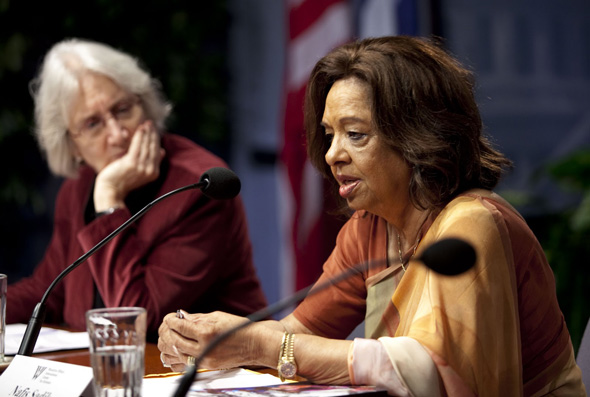“The health, security, and well-being of families depend importantly on the health of women,” said Carol Peasley, president and CEO of the
Centre for Development and Population Activities (CEDPA). “When women have the ability to voluntarily space and limit the number of children they have, maternal and newborn child deaths decrease, as do abortions and abortion-related injuries,” she continued.
Peasley was joined by three panelists on September 28 at the Wilson Center: Dr. Nafis Sadik, special advisor to the UN Secretary General; Tigist Kassa Milko, health communications program coordinator for Panos Ethiopia; and Rosemary Ardayfio, a reporter for the Ghanaian paper, The Daily Graphic.
Ardayfio and Milko both recently participated in a CEDPA-led workshop, which is designed to create effective women champions for family planning and reproductive health.
“The voices of women champions may in fact be the best way to influence policymakers and just average citizens around the world,” said Peasley.
Women’s Rights Essential for Development of All
According to Sadik, women have gained some autonomy over their reproductive health:
However, “progress is quite patchy,” Sadik said. Among the largest economies today—such as Japan, Singapore, and South Korea-are those countries who invested in women’s education, reproductive health, and family planning early on, but many of the poorest countries lag far behind:
“What policymakers everywhere have to understand is that women’s empowerment, gender equality, access to reproductive health services – including family planning – is the solution not only for women’s issues but to many of our developmental problems as well,” said Sadik.
Local Champions for Local Needs
Although Tigist Kassa Milko and Rosemary Ardayfio come from two African countries hundreds of miles apart, their struggles are eerily similar.
In Ethiopia, the more than 1.5 million women who live in pastoral or nomadic areas shoulder many responsibilities, including walking long distances to fetch food and water for their families. The well-being of these women and their families is further strained by the challenges of climate change and limited health service provision.
To help overcome these obstacles, a number of micro-credit associations now offer female pastoralists alternative livelihood options. Panos Ethiopia also provides “reproductive health, family planning, gender-based violence forums” and “trainings on life skills and saving” to those who come for loans, said Milko.
But “when it’s a choice between walking to get water and walking to get contraceptives, water will win,” said Milko, so it is essential to focus on integrating ways to improve livelihoods, health, and ecosystems – also known as population, health, and environment (PHE) programs.
In Ghana, women also grapple with competing issues of development, poverty, healthcare, and cultural barriers. According to Ardayfio, 35 out of every 100 Ghanaian women want to space or limit births but are not using modern family planning methods. As a journalist, she acknowledged that there are many myths about reproductive health that need to be dispelled. The newspaper she writes for, The Daily Graphic, publishes three articles on women’s health each week.
“The stories of women dying from pregnancy-related causes should continue to be told in a compelling manner until our government makes good on the many international commitments it has signed to,” said Ardayfio. “Our decision-makers should be told again and again that it’s time to scale up family planning.”
Event Resources:
Sources: CEDPA, Guttmacher Institute, Population Reference Bureau, UNESCO, UNICEF, USAID.
Photo Credit: Dave Hawxhurst/Wilson Center.

 A Publication of the Stimson Center.
A Publication of the Stimson Center.




